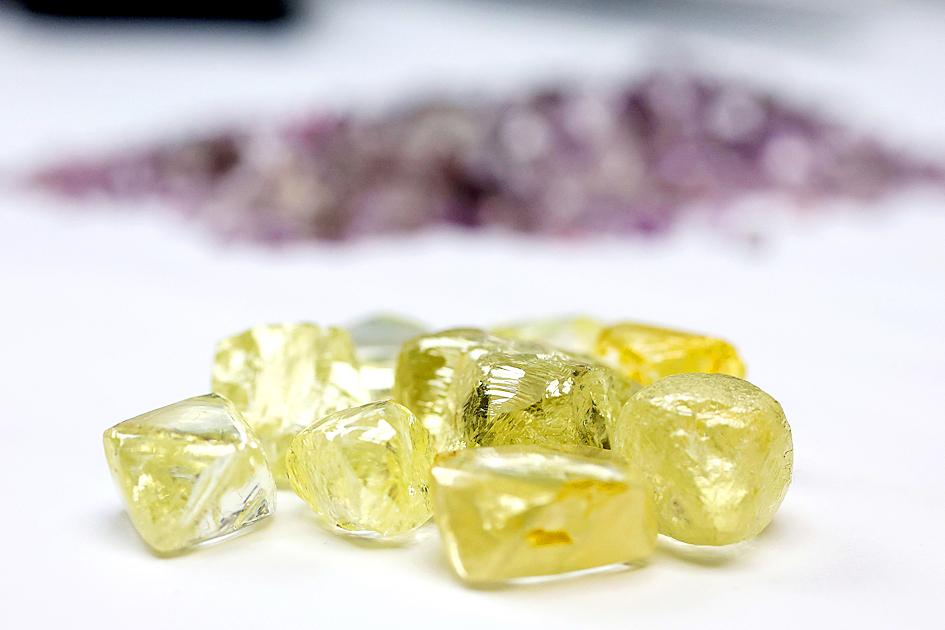In his small office in the Israel Diamond Exchange near the coastal city of Tel Aviv, Pravin Kukadia proudly presents his collection of precious stones.
Between Kukadia’s homeland, India, and his country of residence, Israel, diamonds have forged a key diplomatic and economic link — representing about US$1.5 billion a year and roughly half of all trade between the nations, diamond experts say.
Kukadia first came to Israel in 1996, but soon made regular visits to Israel as a buyer for his family business based in Surat in western India — where 90 percent of the world’s diamonds are cut and polished.

Photo: AFP
“At that time, I bought rough diamonds,” he said, carefully inspecting a particularly rare example, a rose-colored diamond. “I bought small sizes — my specialty was small and cheap.”
Today, the 56-year-old specializes in trading large stones.
In 2003, he moved with his wife and two children to develop his business in Israel, because it was “a major player in the diamond industry” and at the forefront of innovation in the field.
At that time, India “didn’t have the technology like here,” said Kukadia, who imported Israeli technology including laser-machines for his Indian operations.
The Israel Diamond Exchange is home to about 30 Indian companies, making India the foreign nation with the biggest number of firms on the bourse, Kukadia added.
Most Indian diamond families, about 80 people, live close to the diamond exchange in the city of Ramat Gan, and many stay in the same building.
“We are one and the same family,” Kukadia said.
Israeli immigration lawyer Joshua Pex said that Indian diamond traders enjoy a “special status” in Israel, aimed at promoting trade with India.
“Since 2018, they can work and live in Israel indefinitely, and bring their families,” Pex said. “They must renew their visas every three years, compared to two for diamond traders from other countries.”
The huge complex of the diamond exchange is also home to the State Bank of India, the only foreign bank present there, alongside two Israeli banks.
“The diamond industry’s trade with India accounts for about 50 percent of all general trade between Israel and India, representing US$1.5 billion per year,” Israel Diamond Exchange president Boaz Moldawsky said.
Israel sources raw stones from around the world, while many Indian companies specialize in polishing the rocks into gleaming gems.
“We export rough stones, and mainly import polished stones,” Moldawsky said.
While India recognized Israel in 1950, it has traditionally expressed support for the creation of a Palestinian state, and did not establish diplomatic relations with the Jewish state until 1992.
“Diamonds were one of the first commodities exchanged between Israel and India in the early 1970s,” Moldawsky said.
However, bilateral ties go beyond diamonds.
On Thursday, Israeli Minister of Defense Benny Gantz visited India as part of the 30th anniversary of official diplomatic links, where he urged a deepening of defense ties.
Israel sells about US$1 billion of military equipment to India a year.
Cooperation agreements have also multiplied in the fields of water systems, agriculture, health and solar energy.
Other commodities:
‧Gold for August delivery fell US$21.20 to US$1,850.20 an ounce, down 0.38 percent for the week.
‧Silver for July delivery fell US$0.37 to US$21.91 an ounce, declining 0.86 percent weekly, while July copper fell US$0.08 to US$4.47 a pound, but rose 3.71 from a week earlier.
Additional reporting by AP

Intel Corp chief executive officer Lip-Bu Tan (陳立武) is expected to meet with Taiwanese suppliers next month in conjunction with the opening of the Computex Taipei trade show, supply chain sources said on Monday. The visit, the first for Tan to Taiwan since assuming his new post last month, would be aimed at enhancing Intel’s ties with suppliers in Taiwan as he attempts to help turn around the struggling US chipmaker, the sources said. Tan is to hold a banquet to celebrate Intel’s 40-year presence in Taiwan before Computex opens on May 20 and invite dozens of Taiwanese suppliers to exchange views

Application-specific integrated circuit designer Faraday Technology Corp (智原) yesterday said that although revenue this quarter would decline 30 percent from last quarter, it retained its full-year forecast of revenue growth of 100 percent. The company attributed the quarterly drop to a slowdown in customers’ production of chips using Faraday’s advanced packaging technology. The company is still confident about its revenue growth this year, given its strong “design-win” — or the projects it won to help customers design their chips, Faraday president Steve Wang (王國雍) told an online earnings conference. “The design-win this year is better than we expected. We believe we will win

Chizuko Kimura has become the first female sushi chef in the world to win a Michelin star, fulfilling a promise she made to her dying husband to continue his legacy. The 54-year-old Japanese chef regained the Michelin star her late husband, Shunei Kimura, won three years ago for their Sushi Shunei restaurant in Paris. For Shunei Kimura, the star was a dream come true. However, the joy was short-lived. He died from cancer just three months later in June 2022. He was 65. The following year, the restaurant in the heart of Montmartre lost its star rating. Chizuko Kimura insisted that the new star is still down

While China’s leaders use their economic and political might to fight US President Donald Trump’s trade war “to the end,” its army of social media soldiers are embarking on a more humorous campaign online. Trump’s tariff blitz has seen Washington and Beijing impose eye-watering duties on imports from the other, fanning a standoff between the economic superpowers that has sparked global recession fears and sent markets into a tailspin. Trump says his policy is a response to years of being “ripped off” by other countries and aims to bring manufacturing to the US, forcing companies to employ US workers. However, China’s online warriors